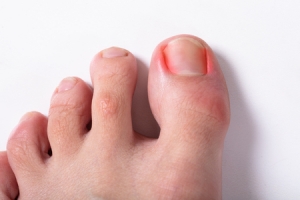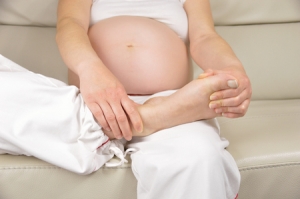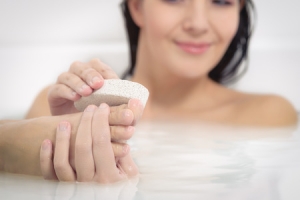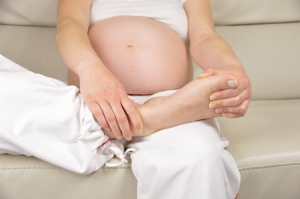Connect With Us
Blogs
Displaying items by tag: ingrown toenail
Healthy Foot Habits for the New Year
January is a time for making a fresh start and resolving to make positive changes. At Superior Foot & Ankle Care, we’d like to encourage our Los Angeles County patients to take some steps to ensure healthier feet and ankles in 2021. Below are some easy tips to implement:
- Commit to a Basic Hygiene Regimen—Did you know that simply washing your feet daily with soap and water and drying them thoroughly can significantly reduce your risk of fungal infections? If you add a dusting of a foot or fungal powder in the morning and a rich moisturizer at night before bed, you’ve got a fast and effective foot care plan.
- Check Your Feet for Changes—It’s easy enough while you’re cleaning your feet to look them over for any symptoms that may signal a developing problem. Check for toes that appear to be moving out of place, bruises, swelling, wounds that are slow to heal, discoloration of skin or nails, and any growths or lumps. If you notice something concerning, contact our Long Beach office by calling: (562) 420-9800 to make an appointment with our podiatrists, Victoria M. Foley and Dr. Constance Ornelas, to examine your feet and diagnose any problems.
- Keep Up with Nail Care—Trim toenails regularly and file any rough edges to prevent them from getting caught and tearing. Always cut nails straight across and be careful not to make them too short or they will be in danger of becoming ingrown.
- Choose Shoes Wisely—One of the single biggest steps you can take to prevent many common foot disorders is wearing good shoes. Look for styles that are made of soft, flexible material and have roomy toe boxes. Good arch support and a cushioned insole are also important. Limit time spent in high heels as these can harm your feet and cause bunions, hammertoes, and other deformities.
- Make Healthy Lifestyle Choices—Regular exercise, a healthy diet, and getting enough sleep all impact the condition of your feet as well as the rest of your body. Don’t try to change everything at once. Small changes that you can sustain will have big payoffs in the New Year!
If you have questions about the care of your feet, don’t hesitate to contact us.
What to Do (and Not Do) for Ingrown Toenails
Few podiatric conditions inspire more fear and are more painful than the ingrown toenail. At Superior Foot & Ankle Care Center, we treat many cases of ingrown toenails in our Los Angeles County/Douglas Park area patients. Nearly every patient leaves our Long Beach office in less pain then when they arrived. The information below will help you deal with this common podiatric problem.
Prevention Pointers
Of course, the best scenario is not having an ingrown nail in the first place! Ingrown nails develop when pressure on the edge of the nail drives it into the surrounding skin. The most frequent reason this occurs? Improper nail trimming. Trim your toenails straight across and not so short that the skin overlaps the edge of the nail. Do not curve the edges when you clip or file the toenails. Other sources of ingrown nails include:
- Fungal infections—keep feet clean and don’t allow them to sit in damp socks for extended periods of time
- Footwear choices—avoid styles that have narrow, pointy toes and high heels that force the toes to be crammed together.
- Toe deformities—overlapping toes, hammertoes and other deformities may increase the risk of ingrown toenails.
- The tendency for nails to become ingrown can also be inherited.
Treatment Do’s and Don’ts
The first sign of an ingrown nail will most likely be pain and redness. Big toes are the most susceptible. If you notice a nail appears to be ingrown, you can soak it in warm water and Epsom salts and then try to gently massage the nail out of the skin. Never attempt to cut the ingrown nail out! If this is unsuccessful, make an appointment and come in to see our podiatrists, Dr. Victoria M. Foley or Dr. Constance Ornelas. The foot doctor can numb the toe and remove the nail. Chronic or recurring ingrown nails may require a minor surgery.
Don’t delay seeking treatment. Ingrown toenails that are not care for properly can become infected. Contact us by calling: (562) 420-9800.
Avoid Foot Problems During Pregnancy
Are you pregnant? Congratulations! At Superior Foot & Ankle Care Center, we know how excited you must be. We also want to do our part to help ensure that your pregnancy proceeds as comfortably as possible. Hormonal changes and weight gain that occur naturally during pregnancy can play havoc on the health of your feet. Below are some common problems pregnant women encounter and what to do about them.
Arch and Heel Pain—these are perhaps the most common complaints pregnant women have about their feet. As your pregnancy progresses, the added weight can have the effect of flattening your arch, resulting in symptoms similar to those of patients with flat feet. Pain in the arch and heel pain due to the strain put on the plantar fascia (the long band of tissue that runs along the bottom of your foot) are not uncommon. To combat this type of discomfort, look for shoes with extra arch support. In some cases, our podiatrists, Dr. Victoria M. Foley or Dr. Constance Ornelas will fit you with a custom orthotic device to wear in your shoes.
Ingrown toenails—hormones released by your body toward the end of your pregnancy to help relax ligaments to make birth easier can affect your feet by causing them to spread. Your shoes may start to feel too tight. When toes are pressed up against each other for long periods of time, ingrown toenails can develop. It may be necessary to buy shoes that are a larger size or wider width for the last trimester.
Swelling—excess fluid in your body, and the position of the baby may result in swollen feet and ankles. This can lead to discomfort and pain. The best way to reduce swelling is by putting your feet up frequently. Stretching, not crossing your legs when sitting and drinking lots of water will help too.
If your feet are giving you trouble during your pregnancy, make an appointment at our Long Beach office in Douglas Park CA by calling: (562) 420-9800. Our podiatrists will help get to the source of your discomfort and prescribe a safe and effective treatment.
Do’s and Don’ts for Better Foot Health
At Superior Foot & Ankle Care Center we want to encourage our patients to be proactive in the health of their feet. There are many ways that you can help prevent foot and ankle disorders.
Below are some basic foot care tips:
- Practice good podiatric hygiene. Wash your feet daily with soap and warm water. Drying feet completely, especially between the toes will help prevent athlete’s foot and other fungal infections.
- Don’t walk barefoot. Even in the comfort of your own home going barefoot increases the risk of puncture wounds from stepping on a sharp object hiding in the carpet or stubbing your toe or foot. In public places, walking with bare feet is an invitation for contagious podiatric conditions such as fungal toenails and
- Always use sunscreen on your feet when you are outside, and feet are exposed. This goes for days when you are out walking in open sandals as well as when you are at the beach or pool.
- Take care of toenails. Keeping toenails trimmed straight across (never with curved edges) and not too short reduces the risk of getting an ingrown toenail.
- Examine your feet periodically. Look for changes in nail or skin color, bruising, swelling, bumps, rashes and redness. Unusual changes can be a sign of a foot problem. If you notice anything concerning, contact our Long Beach office for an Our podiatrists, Dr. Victoria Foley or Dr. Constance Ornelas, will examine your feet and determine if a problem exists, that requires treatment.
- Don’t attempt to treat yourself. “Bathroom surgery” conducted by patients trying to shave corns, or calluses, remove warts or ingrown nails can lead to severe injury and infection. The podiatrist best handles those tasks.
- When in pain, seek treatment. Ignoring foot pain will usually result in condition getting worse. Don’t delay, contact us by calling: (562) 420-9800.
6 Ways to Make Pregnancy Easier on Your Feet
Being pregnant is a joyous time but here at Superior Foot & Ankle Care Center we often find that patients who are expecting a baby weren’t expecting the foot woes that can go along with this condition. Knowing what to expect and taking a few precautions can increase comfort and decrease the risk of injury. Follow these 6 tips while pregnant and your feet will thank you!
- Change your shoes. As your pregnancy progresses and you gain more weight, the stress on your feet increases as well. You may need larger or wider shoes to accommodate these temporary changes (although some women do find that their feet are permanently a larger size, even after giving birth).
- Avoid tight socks and stockings. These, in conjunction with shoes that are already getting a little snug, can increase the risk of developing an ingrown toenail by constantly squeezing your toes together.
- Ditch the heels. Low, wide heels are the way to go now. Your center of balance will shift as your baby grows and this can throw you off balance, making a fall more likely. Wider heels will increase stability.
- Pay attention to where you are walking. Your body releases a hormone called relaxin when you are pregnant that does just what its name says: it relaxes the ligaments in your body. Not just the ones necessary for giving birth, however, but all the ligaments in your body get looser. For your feet, this means a greater likelihood of twisting your ankle. Watch for changes in pavement height and don’t carry a lot of packages at once so as not to obscure your view of where you are walking,
- Stay hydrated. Swelling and excess fluid are normal during pregnancy and when you’re vertical the fluid tends to pool in your ankles leaving them bloated and sore. Although it sounds counterintuitive, drinking more water will actually help you flush excess fluid from your body.
- Put your feet up! This is always good advice when you are pregnant, but for your feet, elevating them above the level of your heart several times a day will reduce swelling and give them the much-needed rest they need.
If you experience symptoms that you think are not normal in your feet (such as excessive swelling that doesn’t go down or pain in one specific part of your foot) contact our Long Beach office at (562) 420-9800 and allow one of our podiatrists, Dr. Victoria Foley or Dr. Constance Omelas to examine your feet and make sure all is well and that your pregnancy proceeds smoothly.





